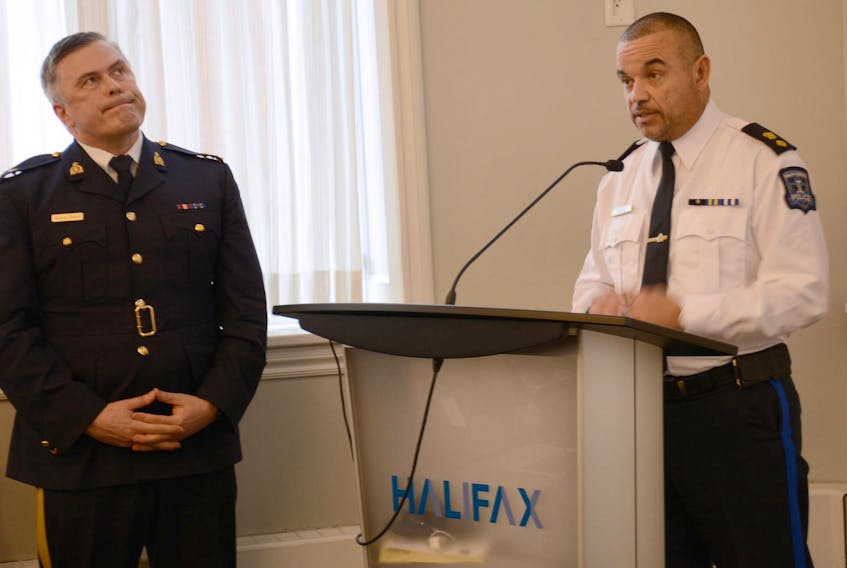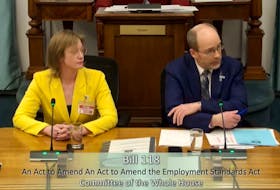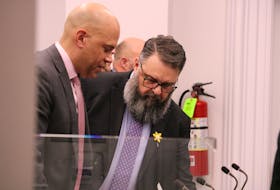The Halifax police commission unanimously voted to push for a suspension of street checks by regional police officers.
“A ban would have symbolically meant a lot to the community but a suspension does the same thing,” said Coun. Lindell Smith (Halifax Peninsula North) of his motion before the seven-member board of police commissioners.
“We are recommending that it ends.”
Police checks can be defined as the police practice of stopping pedestrians or drivers without cause and asking for identification and other information.
The commission will recommend that the Halifax police chief and the chief superintendent of the Halifax district RCMP suspend street checks, pending the receipt and adoption of a policy based on a September 2017 staff report.
The motion also called for recognition that police checks have disproportionately affected the African Nova Scotian community and for a joint statement from the Halifax police chief and the RCMP superintendent to formally apologize to the black community. The motion also called for the chairman of the commission, Coun. Steve Craig, to send a letter to Mark Furey, the provincial justice minister, outlining the board’s street checks position and its recommendation.
“I am very hopeful that everyone who sees this will look at it as something that should be enacted immediately,” Smith said. “It’s up to the minister on their authority, but for our outgoing chief and acting chief that they see it as an opportunity to not only show the community that they are listening as a government body but also the fact that the data shows that street checks have affected communities.”
The street check issue that had been simmering for years was brought to the fore with the March 27 release of a 180-page report by Toronto criminologist Scot Wortley that determined that black civilians in the municipality were almost six times more likely to be street-checked than white people.
“Street checks have contributed to the criminalization of black youth, eroded trust in law enforcement and undermined the perceived legitimacy of the entire criminal justice system,” Wortley said.
The day following the release of the report, provincial Justice Minister Mark Furey directed police across the province to immediately cease using street checks as part of a quota system or performance measurement tool. The minister stopped short of a ban or a moratorium on the practice but promised a follow-up announcement on street checks later in the House session, an announcement that did not come.
Wortley had recommended either an outright ban or restrictive street check regulation. He recommended a moratorium on street checks until it was decided which direction to go.
“As long as I have been living, I have never known the police to have a good working relationship with the black community,” Carlos Beals, a member of the commission and a lifelong resident of Dartmouth North, said Monday.
“The treatment is not right. This, in many cases, has destroyed or attempted to destroy the black community. Policing is the first point of contact with the justice system. We have to be mindful of the pain that this has caused. My position is; do we stop the wound and allow it to heal as we determine the best treatment or do we continue to let the wound bleed?”
Beals called for an end to street checks, soliciting a cheer from some of the 20 citizens who gathered in the gallery of the city hall meeting.
“Today, I think that we need to move forward in a direction that stops ... street checks,” he said.
Carole McDougall, vice-chairwoman of the commission, agreed, calling street checks “appalling and abhorrent.”
“I can’t understand why we would perpetuate this kind of process,” McDougall said. “This report emphasizes a sense of abuse that just feels so wrong.
“This kind of thing has to stop. It really has to stop.”
Whether the police commission’s recommendation is effective in stopping police checks remains to be seen.
Martin Ward, legal counsel for the municipality, said “the power of the (police commission) board is somewhat reduced,” because the operational directions for any police force in the province comes from the justice minister through the Police Act.
“Those powers are largely strategic powers related to policy, the development of policy, overall guidance to the department,” Ward said of the commission’s ability to recommend rather than direct. “The Act reserves to the police chief the day-to-day operation of the department.
Supt. Don MacLean of Halifax police said after the meeting that, from the board’s perspective, “the motion they put forward is one that they think was appropriate in the moment and it is something that we are going to have to look at.”
“We need to generate discussion and we need to do something differently. I think we all accept that. I think we understand that the report has highlighted issues that require some substantive change. How we get to that substantive change can be open for discussion.”
Craig asked MacLean and RCMP Insp. Rob Doyle directly during the meeting if street check quotas existed in their departments. Both said they did not exist and MacLean called the quota concept an “urban myth,” a perception among police officers that they are expected to do something.
“I can tell you from a managerial, from an executive level, we’ve never incentivized street checks,” MacLean said after the meeting. “There has never been a direction from our level in terms of quotas.”
During the meeting and afterwards, Smith maintained that he had spoken to frontline officers in the Halifax police force who say there is a quota.
“What are we missing?” Smith said. “If our frontline officers who are the ones that are policing are saying there is a quota but senior management giving direction say there is not, there is a huge gap that needs to be addressed.
“What I was told by the few (officers) that I’ve spoken to is that it is something that they were told to do.”
Smith said a bad relationship between police and the black community is at the core of the problem but he is hopeful that can change.
RELATED:









